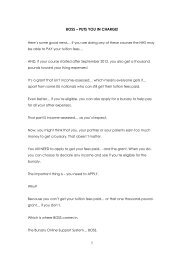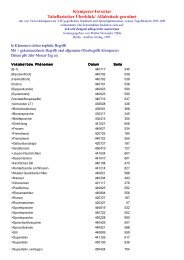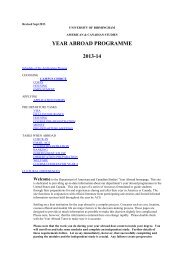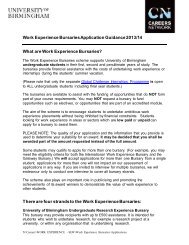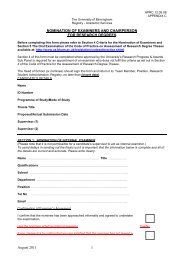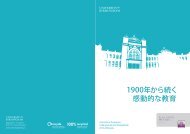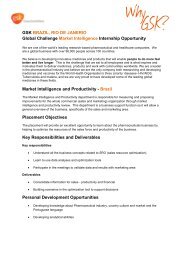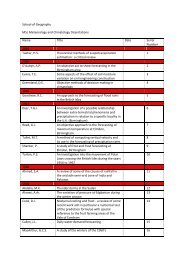APRC 120202 appendix 2 (PDF - 958KB) - University of Birmingham
APRC 120202 appendix 2 (PDF - 958KB) - University of Birmingham
APRC 120202 appendix 2 (PDF - 958KB) - University of Birmingham
- No tags were found...
You also want an ePaper? Increase the reach of your titles
YUMPU automatically turns print PDFs into web optimized ePapers that Google loves.
Code <strong>of</strong> Practice on Placement Learning (draft)1. Introduction2. Placement Learning: Approval3. Placement Learning: Academic Programme & Management4. Placement Learning: Review5. Induction and Preparation6. Leaving Placement Learning Before Completion7. Return to <strong>Birmingham</strong>8. Responsibilities <strong>of</strong> Students9. Responsibilities <strong>of</strong> Placement Providers10. <strong>University</strong> LegislationAppendix 1: Student Placement Form <strong>of</strong> IndemnityAppendix 2: Letter to a company accepting a student placementAppendix 3: Risk Pr<strong>of</strong>iling and Risk Reducing ActionsAppendix 4: Risk assessment formAppendix 5: Insurance1 Introduction1.1 This Code <strong>of</strong> Practice sets out <strong>University</strong> requirements for placement learning. Therequirements are based on the precepts <strong>of</strong> the Quality Assurance Agency’s (QAA) Code <strong>of</strong>Practice; Section 9; Work-based and Placement Learning (September 2007).1.2 The Code <strong>of</strong> Practice is intended to provide a template for planning new placement learningopportunities and is designed to be helpful for the management and review <strong>of</strong> existingplacement learning provision.1.3 It is acknowledged that some Schools may already have extensive procedures in place forthe management <strong>of</strong> placement learning. This Code <strong>of</strong> Practice is intended to complementsuch procedures, and provides the minimum requirements for the management <strong>of</strong> placementlearning.1.4 The Code <strong>of</strong> Practice does not cover learning outside the institution that is not a planned part<strong>of</strong> a programme <strong>of</strong> study, such as part-time, term-time and vacation work which studentshave arranged for themselves.1.5 Throughout this document, the word “Schools” may apply to Departments or even individualprogrammes.1.6 This Code <strong>of</strong> Practice applies to placements <strong>of</strong> a year in length. The extent to whichthese provisions should be applied to placements <strong>of</strong> less than a year will be scalable,depending on the length and type <strong>of</strong> placement activity, however, it is the expectationthat these principles will be applied to some degree when placement activity is proposedand reviewed. Advice and support is available from a range <strong>of</strong> sources including LegalServices, International Relations and the Curriculum Development Unit. In the firstinstance, queries should be directed to Nina Morris, Academic Policy Officer, who willsignpost to the appropriate team.Scope1.6 The QAA Code <strong>of</strong> Practice states:
Placement learning is the learning achieved during an agreed and negotiated period <strong>of</strong>learning that takes place outside the institution at which the full or part-time student isenrolled or engaged in learning. As with work-based learning, the learning outcomes are anintended as integral parts <strong>of</strong> a programme <strong>of</strong> study1.7 Accordingly, this Code <strong>of</strong> Practice covers placement learning within the following broadprogramme categories:.1 Study abroad: i.e. programmes which include a year abroad either in place <strong>of</strong> or in additionto a year that would normally be spent at <strong>Birmingham</strong>. This category incorporatesinternational exchange and Erasmus exchange..2 Industrial Placement/Work Abroad (including work based learning and pr<strong>of</strong>essionalexperience), i.e. programmes which incorporate a year in industry in the UK or abroad eitherin place <strong>of</strong> or in addition to a year that would normally be spent at <strong>Birmingham</strong>..3 Intercalated years (optional and mandatory), i.e. programmes onto which students areenrolled whilst still also enrolled on their primary programme <strong>of</strong> study. Students enrolled onan intercalated programme suspend their registration on their primary programme <strong>of</strong> study.Any credit achieved on an intercalated year does not count towards the overall mark for theoriginal programme <strong>of</strong> study, but may result in a separate qualification), or a suffix to the title<strong>of</strong> the original programme <strong>of</strong> study (i.e. BSc Physics with Year in Computer Science)..4 Pr<strong>of</strong>essional and clinical experience placements (UK or international), i.e. programmes whichinclude industrial, clinical or pr<strong>of</strong>essional placements as part <strong>of</strong> their programmerequirements leading to pr<strong>of</strong>essional qualifications (for example, MBChB, BNurs, InitialTeacher Training, BA & MA Social Work).2 Placement Learning: Approval2.1 The <strong>University</strong>, through the Programme Approval Review Committee, is responsible forapproving new placement learning opportunities.2.2 Schools should set out proposals as follows:(a)(b)(c)In the case <strong>of</strong> an entirely new programme <strong>of</strong> study with a placement year, Schoolsare required to complete the new programme proposal process, which includes thesubmission <strong>of</strong> a plan to develop a new programme form, followed by a programmeproposal and specification. The “Proposal to add a new placement” form must alsobe completed.In the case <strong>of</strong> the addition <strong>of</strong> a placement year to an existing programme <strong>of</strong> study (aseither an optional or mandatory year), Schools are required to complete only the“Proposal to add a new placement” form.In the case <strong>of</strong> placements <strong>of</strong> less than a year, Schools should complete the ModuleProposal form, which contains questions relating specifically to placements.2.3 These forms, and guidance on their completion, can be found on the CurriculumDevelopment Unit web pages: http://www.as.bham.ac.uk/cdu/
2.4 When seeking approval for placement learning opportunities, within new or existingprogrammes, Schools should address requirements laid out in Section 3, as appropriate.3 Placement Learning: Academic Programme & Management3.1 Strategic Fit <strong>of</strong> the Placement.1 Schools should establish relationships with organisations or institutions whose missions andnational or international standing are comparable to its own..2 Schools should determine that a placement provider is able to:(a) Provide learning opportunities which enable the intended learning outcomes to beachieved. These learning outcomes should be identifiable.(b) Support students during their placement.(c) Fulfill their responsibilities under health and safety legislation in the workplace, havingregard to the level <strong>of</strong> skill and experience <strong>of</strong> students on a placement..3 For placements which take place in an academic institution, Schools should normally assessthe academic facilities <strong>of</strong> the placement provider, such as library and computing provision,academic accommodation and teaching facilities and facilities for students with specialneeds to ensure that they are <strong>of</strong> an acceptable standard for students registered at the<strong>University</strong> <strong>of</strong> <strong>Birmingham</strong>..4 Where a School is proposing a new exchange partner for study abroad, the School will beexpected to demonstrate to the Programme Approval Review Committee that due diligenceon the above points has been undertaken. This will be demonstrated through the completion<strong>of</strong> the “Proposal to add a new placement” Form.3.2 Restrictions on Provision <strong>of</strong> Placement Learning opportunitiesStudents from non-EEA countries.1 Schools should consider carefully the implications for students from non-EEA countries whenconsidering the addition <strong>of</strong> a placement to an existing programme <strong>of</strong> study or whenconsidering a new programme with placement provision. While it may be possible forstudents from non-EEA countries to undertake placement learning, it is very important toremember that these students are not automatically guaranteed a visa for entry to anothercountry for the duration <strong>of</strong> their placement and will still need to meet rigorous applicationcriteria and make an application in good time to start any potential placement. It is thereforerecommended that the Schools contact the International Student Advisory Service (ISAS) asearly as possible (http://www.as.bham.ac.uk/studentlife/international/index.shtml).Additional language or skills preparation.2 Schools should consider carefully the level <strong>of</strong> written and oral linguistic competence requiredbefore a student is permitted to undertake a placement. This will clearly vary depending onwhether or not modules taken overseas will contribute towards the <strong>Birmingham</strong> degree.Quota.3 Schools should also take into consideration whether they wish to place any restrictions onparticipation <strong>of</strong> students on a placement opportunity. For example, the placement
opportunity may be limited by numbers, and Schools may wish to restrict participation in anoptional placement year to students who have achieved a certain mark in specific modules,or who have achieved a specified overall year mark. Any such restrictions will be specified inthe programme requirements and agreed by Senate or under delegated authority.3.3 Academic Requirements.1 Schools should articulate within the programme/module specification:• The structure <strong>of</strong> the placement and how the placement contributes to the overall programme<strong>of</strong> study;• Pr<strong>of</strong>essional, Statutory and Regulatory Body requirements, as appropriate;• How the placement provider will ensure that opportunity is provided to the student to achievethe intended learning outcomes (through a mechanism such as a Learning Agreement);• Assessment <strong>of</strong> the placement and the consequences <strong>of</strong> student failure.Contribution to Programme.2 Regardless <strong>of</strong> the form placement learning takes, Schools need to consider the contributionthat placement learning makes to the overall aims <strong>of</strong> the programme and programmelearning outcomes when designing, approving, monitoring and reviewing the programme andwhen designing and implementing the assessment strategy.Learning Outcomes.3 Schools should ensure that their programme specifications and student guidance notesmake clear what the expectations are <strong>of</strong> the placement learning activity. Programmespecifications must be clear about the outcome for students if the placement year is failed..4 Placement learning opportunities may provide students with many <strong>of</strong> the outcomes identifiedin the Framework for Higher Education Qualifications(http://www.qaa.ac.uk/Publications/InformationAndGuidance/Documents/FHEQ08.pdf). Forexample, the descriptor for an Honours (H) level degree includes the following statements:(a) Students should demonstrate the ability to manage their own learning(b) Students should be able to communicate information, ideas, problems and solutions toboth specialist and non-specialist audiences(c) Students should have qualities and transferable skills necessary for employmentrequiring the exercise <strong>of</strong> initiative and personal responsibility, decision-making incomplex and unpredictable contexts and the learning ability needed to undertakeappropriate further trainingAssessment, Progress and Monitoring.5 The assessment <strong>of</strong> placement learning should be subject to the usual School procedures forinternal moderation and external examining, and standards applied to assessment <strong>of</strong>placement learning must be consistent with QAA Subject Benchmark Statements and otherreference points, such as the Framework for Higher Education Qualifications. If theplacement learning forms a substantial part <strong>of</strong> the module credit, the learning outcomesshould be identified and the assessment test whether these agreed outcomes have beenachieved.
.6 Programmes which do not require assessment throughout the placement period should havean alternative means <strong>of</strong> monitoring the academic progress <strong>of</strong> students on placement toensure that they are on track for achieving the learning outcomes.Credit Transfer.8 When proposing a programme or module involving placement learning in another academicinstitution which involves the transfer <strong>of</strong> credit from the placement institution to <strong>Birmingham</strong>,the School shall need to ensure that the level <strong>of</strong> the modules is comparable with the<strong>Birmingham</strong> modules they replace; that workload is appropriate (60 ECTS creditscorresponds to one year <strong>of</strong> full time study in the European Credit Transfer Scheme) and thatthe module content is comparable. The modules students are allowed to take for credit mustcontribute to a coherent programme <strong>of</strong> study and enable students to be prepared formodules they will take when they return to <strong>Birmingham</strong>.3.4 Placement Management.1 The proposal should indicate:• Academic and other support available to students from the placement provider and the<strong>University</strong>;• The name <strong>of</strong> the Placement Learning Co-ordinator• Monitoring and evaluation <strong>of</strong> academic quality and standards and student support andlearning opportunities;• Induction and Preparation: see Section 5• Health and Safety (including disabled student facilities and access)• Insurance requirements• Visa and entry requirements for the CountrySupport Available to Students on Placements.2 In most cases, placement students continue to be registered at <strong>Birmingham</strong>, and thereforehave access to student support services available within the <strong>University</strong>..3 Schools should designate one or more specific member(s) <strong>of</strong> staff to manage placements(the “Placement Learning Co-ordinator”). In some cases it may be appropriate to have aPlacement Learning Co-ordinator for an individual programme <strong>of</strong> study, particularly where aprogramme <strong>of</strong> study spans more than one School..4 Schools should ensure that the members <strong>of</strong> academic staff involved in placement learningare have appropriate access to the information specific to the type <strong>of</strong> placement, such ashealth and safety regulations and legislation or competence in another language. Schoolsare encouraged to ensure that documentation covering the School role is available and thatadequate handover between staff takes place when School responsibilities change.Members <strong>of</strong> staff involved in organising work placements should be aware <strong>of</strong> relevantlegislation and <strong>University</strong> Safety Policy and know where to get further information on healthand safety matters and data protection..5 The Counselling Service is currently trialing an online counselling facility which is available tostudents on placements who are unable to access the service during normal opening hours.Students who wish to arrange online counselling need to register with the service via anonline registration form -http://www.as.bham.ac.uk/studentlife/counselling/online/registration.shtml.
Study Abroad Support (for Staff).5 International Relations have created a comprehensive document which sets out guidelinesfor Staff involved in supporting students on Study Abroad Programmes. For moreinformation, or to obtain a copy, please contact the Study Abroad Office:studyabroad@bham.ac.uk.Insurance.6 When planning a new placement learning opportunity, Schools should give carefulconsideration to insurance matters, particularly in cases where students may be placed in anenvironment which has particular associated risks. Schools should ask any new prospectiveplacement provider to complete the Student Placement Form <strong>of</strong> Indemnity (<strong>appendix</strong> 1) andshould keep a copy <strong>of</strong> this within the student file. In case <strong>of</strong> any queries, these should bedirected towards Gill Kelsall, Insurance Office at g.l.kelsall@bham.ac.uk..7 Students should be provided with copies <strong>of</strong> the summary <strong>of</strong> cover and contact information incase <strong>of</strong> emergency. A copy <strong>of</strong> the summary <strong>of</strong> cover with contact details can be downloadedfrom the Insurance Office website: http://www.travel.bham.ac.uk/newtravelcover.pdfWork Placements.8 Prior to students commencing on a work placement, Schools should write to the placementprovider confirming the placement, and setting out a record <strong>of</strong> the responsibilities <strong>of</strong> theplacement provider, <strong>University</strong> (School) and student. Schools should ensure that theplacement provider is made aware <strong>of</strong> the <strong>University</strong>’s Regulations pertaining IntellectualProperty 1 . During discussions with placement providers, Schools should discuss theownership <strong>of</strong> intellectual property created by students and arising from their studies. If theplacement provider is not willing to grant ownership <strong>of</strong> rights to any intellectual property tothe student and the <strong>University</strong>, including royalties arising from patents, Schools shouldconfirm that the student has been made aware <strong>of</strong> this situation and that they are content towaive this right..9 Schools should also establish what will happen if the student is dismissed by the placementprovider, or suspended from the placement, and ensure that the student understands theimpact that this will have on their programme <strong>of</strong> study. A sample letter to a companyaccepting a student on a work placement can be found at <strong>appendix</strong> 2.3.5 Health and Safety.1 The <strong>University</strong>’s Health and Safety Policy (http://www.hsu.bham.ac.uk/documents/0uhsp.pdf) extends to student activities away from <strong>University</strong> premises including student placements..2 In particular, the Head <strong>of</strong> Schools must ensure that:• appropriate arrangements are agreed and in place for <strong>University</strong> staff/studentsworking in premises not under the sole control <strong>of</strong> the <strong>University</strong>; and• appropriate arrangements are in place for student placements;.3 The <strong>University</strong> has a duty to ensure, so far as is reasonably practicable, that students are notexposed to risks to their health and safety. Schools should ensure that any assessment <strong>of</strong>1 http://www.birmingham.ac.uk/Documents/university/legal/regulations.pdf, Regulation 5.4
potential new placement learning opportunities includes appropriate investigations beingmade into the health and safety arrangements in place for the learning/ working environmentand enquires made as to the standard and location <strong>of</strong> <strong>University</strong> or provider ownedaccommodation. Schools should ensure that a risk assessment has been carried out for anynew placement learning opportunity. A risk pr<strong>of</strong>ile and set <strong>of</strong> risk reducing actions isattached at <strong>appendix</strong> 3. A sample risk assessment form is attached at <strong>appendix</strong> 4..4 The necessity for a site visits extends to most placement learning opportunities. It isacknowledged, however, that in some circumstances it may be unrealistic or inappropriatefor a site visit to be undertaken. In such cases, the risk assessment should be carried out onthe basis <strong>of</strong> the information available. If there are reasonable concerns regarding the safety<strong>of</strong> students on the placement following the risk assessment, it may be necessary for theSchool to reconsider undertaking a site visit. In cases where the School does not carry out asite visit on the basis that it is not reasonably practical, it should record the reasoning for thison the Risk Assessment Form (<strong>appendix</strong> 4)..5 When setting up a placement learning opportunity, Schools should satisfy themselves <strong>of</strong>the following:a) If it is a requirement in the country <strong>of</strong> the placement for an organization to have a Health andSafety policy, the placement provider should confirm that they have one to the <strong>University</strong>.b) It is sufficient for the placement provider to confirm that they are compliant with their ownHealth and Safety policy and that there is a mechanism in place for students on placement t<strong>of</strong>amiliarize themselves with it;c) School staff should instruct students to familiarize themselves with the Health and SafetyPolicy <strong>of</strong> the placement provider;d) For placements in countries where there is no legal requirement to have a Health and SafetyPolicy, discussions must be held between the School and the student as to what areappropriate risks and health and safety measures to be undertaken;e) Health and safety considerations should follow a risk based approach. For major nationaland international companies this should be relatively simple, as many aspects will be “lowrisk” and therefore little or no action is required to be taken. It should also be relativelysimple to obtain such an organisation’s Health and Safety Policy..6 When planning a placement learning opportunity, Schools may find it helpful to refer toguidance published by Universities and Colleges Employers Association (UCEA) on theimplementation <strong>of</strong> good Health and Safety Practice on placements:Guidance on Health and Safety in Fieldworkhttp://www.ucea.ac.uk/objects_store/guidance_on_health_and_safety_in_fieldwork.pdfGuidance on Health and Safety for the placement <strong>of</strong> Higher Education Studentshttp://www.ucea.ac.uk/objects_store/ucea_health_and_safety_guidance_for_the_placement_<strong>of</strong>he_students.pdf.7 Where a School has concerns regarding the risk based approach to Health and Safety <strong>of</strong>individual placements, they should contact the <strong>University</strong>’s Health and Safety Unithttp://www.hsu.bham.ac.uk/).Health and Safety for Overseas Travel.8 The <strong>University</strong>’s Health and Safety Guidance on Traveling and Working Abroad(https://www.intranet.bham.ac.uk/university/hsu/documents/hsguidance/24twa.pdf) states
that the Head <strong>of</strong> the relevant budget centre has responsibility for making arrangements toensure risks are minimized and controlled. These include:• Bringing the guidance to the attention <strong>of</strong> those arranging and carrying out work abroad.• Not allowing travel to ‘Prohibited Countries’ or ‘Prohibited parts <strong>of</strong> countries’.• Requiring those travelling and/or working abroad to use the <strong>University</strong>’s insurance.• Requiring those travelling and/or working abroad to deposit details <strong>of</strong> their itinerary andcontact details with the Budget Centre..9 It should be noted however that this guidance DOES NOT cover the clinical work thatstudents in the College <strong>of</strong> Medical and Dental Sciences undertake, including the vaccinationsand other precautions required. The responsibility for health and safety in clinical work lieswith the programme <strong>of</strong> study to which the student belongs..10 In addition, the Foreign and Commonwealth Office (FCO) and Department <strong>of</strong> Health provideup to date information on dangerous or politically unstable locations and travel health risks.Students are advised that they must check FCO advice for the country and region they aregoing to immediately prior to travel. More information can be found at:http://www.fco.gov.uk/en/..11 It is acknowledged that some placements will be set up as part <strong>of</strong> an agreement that hasalready been arranged by International Relations. In these cases, it may not be necessaryfor Schools to conduct risk assessments for the placement institution, if these have alreadybeen carried out by International Relations. In order to establish whether a risk assessmentneeds to be carried out, Schools should discuss with International Relations what health andsafety checks were undertaken as part <strong>of</strong> the set up <strong>of</strong> the agreement, and whether theseshould be reviewed. Where sufficient health and safety checks have already been carriedout by International Relations, the School should indicate this on the “Proposal to add aplacement” form.4 Placement Learning: Review4.1 The <strong>University</strong>, through the Quality Assurance Committee, is responsible for ensuring thequality and standards <strong>of</strong> placement learning through oversight <strong>of</strong> the Annual Review process.4.2 Schools should review their placement provision as part <strong>of</strong> the Annual Review process.Assessment <strong>of</strong> placement modules should be subject to scrutiny by External Examiners inline with <strong>University</strong> policy. Further information regarding the Annual Review and ExternalExaminers processes is available from the Academic Quality Unit:http://www.as.bham.ac.uk/aqu/4.3 There should also be mechanisms in place to solicit feedback from current and formerstudents, placement providers and external examiners to ensure the quality and standards <strong>of</strong>a placement. Where appropriate, the feedback should be shared with the next student(s) togo on the placement.5 Induction and Preparation5.1 Schools are responsible for providing students with detailed information appropriate to theirplacement learning before the placement learning commences – both via written guidanceand briefing meetings.
5.2 Briefing meetings should ideally involve students who have already completed placementspreviously and incoming exchange students from the relevant countries and institutions.5.3 The following information should be provided:Contact Information & Associated Processes.1 The name <strong>of</strong> the Placement Learning Co-ordinator..2 Contact numbers for support services at the <strong>University</strong> <strong>of</strong> <strong>Birmingham</strong>, such as the student’sPersonal Tutor, the <strong>University</strong> Senior Tutor, the Guild <strong>of</strong> Students’ Advice andRepresentation Service and Nightline..3 The names <strong>of</strong> contacts at the placement organization and local emergency contacts.(Schools should obtain details <strong>of</strong> next <strong>of</strong> kin or another person to be contacted in the event <strong>of</strong>an emergency.).4 The process for notifying the student <strong>of</strong> any significant changes in the location <strong>of</strong> theplacement or working practices..5 The process for notifying the <strong>University</strong> <strong>of</strong> a student’s contact details during their placement.Contextual Information.6 Legal or ethical considerations, such as any pr<strong>of</strong>essional requirements for confidentiality andsignificant/ relevant differences in legislation, local customs and practices..7 Practical issues relating to travel, insurance, financial and banking arrangements, personalsecurity, accommodation, cost <strong>of</strong> living and any host country formalities (such as residencepermits)..8 Cultural orientation and work expectations..9 Emergency procedure whilst overseas.Health and Safety.10 Schools should inform students, where appropriate, <strong>of</strong> the need to check immunizationrequirements for the country <strong>of</strong> placement. These should be checked with student’sindividual doctors as requirements change regularly and depend on the region, not justcountry, to be visited..11 The <strong>University</strong>’s Occupational Health Unit provides services to staff and post-graduateresearch students. This includes advising on the vaccinations required for placements andproviding these, with the exception <strong>of</strong> malarial prophylaxis and yellow fever vaccination.Advice and vaccination for Post-graduate taught and undergraduate students may beprovided, but at a cost to the School. The exception is Clinical Undergraduate Electiveswhen their Occupational Health Service at UHB should be approached..12 Schools should also make student’s aware <strong>of</strong> the student’s responsibility for health andsafety; what to do if the placement provider expects students to do work they considerhazardous or beyond their physical capacity; the role <strong>of</strong> trade union appointed safetyrepresentatives.
Insurance.13 Schools should make students aware <strong>of</strong> their obligations in respect <strong>of</strong> ensuring that they areproperly insured as set under 3.4. In order to be covered by the <strong>University</strong>’s InsurancePolicy, students must complete student registration or re-registration with the <strong>University</strong> <strong>of</strong><strong>Birmingham</strong> as well as their host institution at the start <strong>of</strong> each academic session. Insurancecover will not start until the date that the student registers. More information can be found at<strong>appendix</strong> 5..14 Schools should establish in advance <strong>of</strong> the placement what status students will have; e.g. if aplacement is in an organization, whether they will be treated as a member <strong>of</strong> staff forinsurance purposes; and ensure that students are informed <strong>of</strong> any conditions <strong>of</strong> their status.Financial Implications.15 Schools should make students aware <strong>of</strong> the financial implications <strong>of</strong> placement whenselecting the programme or how they will spend the year. In addition to statutory support,students on a year in industry/placement and paying full fees are eligible for the <strong>Birmingham</strong>Grant and Scholarship, if they meet the current criteria. Students on a year abroad are noteligible for the <strong>Birmingham</strong> Grant or Scholarship. More information can be obtained from theStudent Funding Office: http://www.as.bham.ac.uk/studentlife/finance/Students on International or Erasmus exchanges.16 Students undertaking an international or Erasmus exchange are required to attend a predeparturegroup briefing organised by International Relations. Group briefings are organisedby country/region in the Spring term and students are provided with the following information:1. Study Abroad Handbook, which includes practical guidance to help students prepare fortheir placement period overseas2. <strong>University</strong> <strong>of</strong> <strong>Birmingham</strong> Insurance Policy and Health Questionnaire3. Advice on the Application process4. Information on Student Funding including the Erasmus Grant (if applicable) and anyrelevant bursaries and awards5. Accommodation form for the return year6. Checklist <strong>of</strong> things to do before leaving the UK7. Emergency contact procedures8. Country-specific information and adviceInternational students with visa requirements.17 Where appropriate, students should be made aware <strong>of</strong> the <strong>University</strong>’s International StudentAdvisory Service which provides a wide range <strong>of</strong> support to international students, including,but not restricted to the following:a) Advice, guidance and information on student visas (entry clearance visas and extension<strong>of</strong> leave to remain in the UK);b) Advice, guidance and information on student dependant visas (entry clearance andextensions);Students with a disability
.18 If any special arrangements are required by a disability or other condition, students shouldbe advised to consult the <strong>University</strong>’s Disability and Learning Support Service (DLSS). Thismay mean that an existing Student Support Agreement may require alteration to take intoaccount specific situations on the placement. In such cases, the Student, School and DLSSshould agree the necessary amendments with the placement provider in advance <strong>of</strong> theplacement.6 Leaving Placement Learning Before Completion6.1 If a student contacts the School wanting to leave the placement due to homesickness orother non-medical reasons, they must be made informed <strong>of</strong> the academic consequences(and where relevant financial consequences) <strong>of</strong> failing to complete the placement. Thestudent should consult with their personal tutor and the Placement Learning Co-ordinator fortheir School, and where appropriate, the Welfare Tutor and/or Year Co-ordinator.6.2 If the student must leave the placement due to medical reasons, the student’s personal tutor,and the Placement Learning Co-ordinator (and where appropriate, the Welfare Tutor and/orYear Co-ordinator) should be informed. All students travelling abroad for their placement areautomatically covered by the <strong>University</strong>’s insurance policy, providing that they register at thestart <strong>of</strong> each Academic Session and do not participate in activities which would invalidate thepolicy. For more details, visit http://www.travel.bham.ac.uk/6.3 In either <strong>of</strong> the above situations the School should maintain contact with the placementprovider and the student.Implications for Erasmus students <strong>of</strong> coming home early6.4 If a student on an Erasmus placement has to interrupt their Erasmus placement abroad andis unable to complete their period <strong>of</strong> study/work overseas, the British Council (NationalAgency for Erasmus) may require some or all <strong>of</strong> the funding to be reimbursed. This will beconsidered on a case by case basis.6.5 If the student is unable to complete the minimum mobility period <strong>of</strong> 3 months due toextenuating circumstances, they may have a second opportunity to undertake an Erasmusplacement and receive a grant, but again this is considered on a case by case basis by theNational Agency.6.6 For further guidance, the Erasmus Institutional Contact in International Relations should becontacted.7 Return to <strong>Birmingham</strong>Accommodation7.1 Although students are responsible for finding their own accommodation, it is good practicefor Schools to provide students with details <strong>of</strong> who to contact in order to facilitate thisprocess. Students should be directed in the first instance to Housing and AccommodationServices http://www.has.bham.ac.uk/studentaccom/ .Module selection7.2 While students are on placement, they need to be informed about and prepare for their nextyear at the <strong>University</strong>. Schools should ensure that students participating in a placement
have the same access to information (and within the same timescales) as students who arenot participating in the placement year. It may be appropriate to include a discussion onmodule selection for the next year when visiting the students on placement, but in any case,Schools should ensure that students understand the process and timescale for modulesection for their next year.Careers Advice7.3 Students away from the <strong>University</strong> just before their final year may miss out on careers advicevital to the start <strong>of</strong> graduate recruitment early if this occurs in the Autumn Term. Schoolsmay choose to assist students by providing careers advice in their handbooks, during visitsand upon the students’ return to campus.7.4 The Careers Service delivers many <strong>of</strong> its advice and information services through its website and students should be encouraged to take advantage <strong>of</strong> these to integrate their careerplanning with their personal development planning. Many Schools include input from theCareers Service in their pre-departure briefings for students and the Careers Service cansend information to students at their placement that will support their career planning.Individual support is also available by e-mail.8 Responsibilities <strong>of</strong> Students8.1 Most Schools impress upon students their role as representatives <strong>of</strong> the institution andresponsibilities towards placement providers, customers, clients, patients and employees.This is generally mandated by pr<strong>of</strong>essional body requirements for programmes subject toFitness to Practise requirements and is good practice in all placement learning contexts.'Students have a responsibility to meet the norms and expectations for pr<strong>of</strong>essional conductin the particular field <strong>of</strong> work or study that they are undertaking through the work-based orplacement learning including those students who are on an overseas placement. Forexample, students on a health-related practice must conduct themselves and practice withinan ethical framework'QAA Code <strong>of</strong> Practice Section 9: Placement Learning8.2 Where a placement may provide the student’s first experience in a foreign country or workenvironment, it is also important to inform students <strong>of</strong> their responsibilities for managing boththeir own learning and pr<strong>of</strong>essional relationships, recording progress and achievements andfor alerting the placement provider and <strong>University</strong> to problems with the placement as soon aspossible.8.3 Students have a responsibility to make themselves aware <strong>of</strong> the level and content <strong>of</strong> anymodules that they will be studying whilst on their placement year, as well as ensuring thatthey have received information from their School as to how their placement year will beassessed, and the implications <strong>of</strong> failure.Insurance8.4 All students must ensure that they abide by the terms and conditions <strong>of</strong> the <strong>University</strong>’sInsurance Policy. In order to be covered by the Policy, it is the responsibility <strong>of</strong> the Studentto re-register at the start <strong>of</strong> each year. If they do not re-register, they will not be covered bythe <strong>University</strong>’s Policy.
8.5 Students are responsible for ensuring that they have the appropriate level <strong>of</strong> cover for anyactivities that they undertake. For example, if the student intends to participate in certainsports, they may required to take out separate insurance, which they are responsible forpaying for. More information can be found here: http://www.travel.bham.ac.uk/ .8.6 Students are responsible for checking with the host institution if additional insurance isrequired. For example, some American institutions require extra cover to be taken out inaddition to the <strong>University</strong> <strong>of</strong> <strong>Birmingham</strong>’s insurance cover. If this is the case, students areadvised to contact Gill Kelsall, Insurance Office for advice g.l.kelsall@bham.ac.uk. Ifadditional insurance is required, it is the student’s responsibility to pay for this.Health and Safety8.7 It is the responsibility <strong>of</strong> students on placements to comply with any instruction given to themby an appropriate supervisor and to bring any questions or problems, particularly those <strong>of</strong>understanding, to the attention <strong>of</strong> their supervisor. Participants must acknowledge their ownresponsibilities for the health and safety <strong>of</strong> both themselves and others. The authority andresponsibilities <strong>of</strong> any other designated supervisor in relation to safety must be clearlydefined and understood by all members <strong>of</strong> the party.8.8 Students undertaking work placements will normally have the same legal duties as otheremployees in the workplace. Students are required to:(a) Take reasonable care <strong>of</strong> their own health and safety and that <strong>of</strong> others affected by theiracts or omissions(b) Co-operate with the placement provider in complying with the provider’s legal duties(c) Maintain commercial confidentiality(d) Not interfere intentionally or recklessly with, or misuse, anything provided in the interest<strong>of</strong> health, safety or welfareStudent Attendance and Reasonable Diligence8.9 The <strong>University</strong> <strong>of</strong> <strong>Birmingham</strong> has a Code <strong>of</strong> Practice identifying the steps to be followedwhen students (on all undergraduate and postgraduate programmes <strong>of</strong> study) are notshowing reasonable diligence in their approach to their academic studies due tounsatisfactory attendance and/or lack <strong>of</strong> academic progress. This Code <strong>of</strong> Practice applies t<strong>of</strong>ull-time and part-time students, and applies to those on placements as part <strong>of</strong> theirprogramme <strong>of</strong> study. The Code <strong>of</strong> Practice applies equally to students who are based inthe UK or overseas.8.10 It is the responsibility <strong>of</strong> the student to familiarise themselves with the provisions <strong>of</strong> this Code<strong>of</strong> Practice, and they may seek advice and guidance on its interpretation and operation, andits associated procedures, from their UoB School, Registry, or the Advice andRepresentation Centre <strong>of</strong> the Guild <strong>of</strong> Students.8.11 The Code <strong>of</strong> Practice on Student Attendance and Reasonable Diligence is available at:http://www.birmingham.ac.uk/Documents/university/legal/student-attendance-reasonablediligence.pdf9 Responsibilities <strong>of</strong> Placement Providers9.1 Work-based or placement providers should be encouraged to play an active role in theopportunities provided for the student. To support them in this role they need clear
information from the Schools about the objectives <strong>of</strong> the work-based or placement learning,their specific roles and responsibilities, the nature and scope <strong>of</strong> the activity involved and howresponsibilities are to be fulfilled. They will benefit from guidance about their involvement inthe procedures for the monitoring <strong>of</strong> the progress <strong>of</strong> students and mechanisms for reportingto the awarding institution at the end <strong>of</strong> the work-based or placement learning opportunity.9.2 A work-based or placement provider may be involved in providing a mentoring or supervisingrole. The responsibilities <strong>of</strong> these important roles need to be clearly identified and anytraining for the mentor or supervisor provided before the student begins the opportunity.9.3 It is good practice to inform the work-based or placement provider about visits from theacademic or support staff, and any change(s) in the student's circumstances, in advance<strong>of</strong> the provision commencing.9.4 Work-based or placement providers find it helpful to have clear information about action tobe taken if they are no longer able to <strong>of</strong>fer a work-based or placement learning opportunity orif they have any kind <strong>of</strong> problem or complaint concerning the conduct <strong>of</strong> the student.9.5 Once a placement provider has been deemed an appropriate partner for <strong>Birmingham</strong>, thereare three main areas <strong>of</strong> responsibility <strong>of</strong> which placement providers need to be aware:(a) Provision <strong>of</strong> learning opportunities(b) Role <strong>of</strong> placement providers in assessment(c) Role <strong>of</strong> placement providers in ensuring the Health and Safety <strong>of</strong> students(a) Provision <strong>of</strong> learning opportunities9.5.1 Once the level and content <strong>of</strong> modules and workload is established with a partnerinstitution, it is necessary to ensure that students have access to the modules they requirefor their degrees. Schools should agree with placement providers the level and content <strong>of</strong>modules <strong>of</strong>fered and accessibility <strong>of</strong> modules to UoB students, particularly with regard tothe learning outcomes which must be achieved as part <strong>of</strong> the placement. The ErasmusScheme requires a ‘Learning Agreement’ to be drawn up between both institutions prior to astudent’s departure. This lists the modules which the student has chosen; confirms that thehome institution considers these modules to be appropriate and that the placement providerguarantees their availability. A Learning Agreement forms a useful safeguard for studentsand should be seen as a model for placements wherever possible. In instances wherestudents organise their own placement, it is important that they are aware <strong>of</strong> the learningoutcomes they must meet whilst on the placement.(b) Role <strong>of</strong> placement providers in assessment9.5.2 Although an evaluation <strong>of</strong> the student by the placement provider may not contributeto degree credit, it has been identified by many pr<strong>of</strong>essional and statutory bodies as arequired aspect <strong>of</strong> a student’s pr<strong>of</strong>essional development and as useful in terms <strong>of</strong> personaldevelopment.(c) Role <strong>of</strong> placement providers in ensuring the Health and Safety <strong>of</strong> students9.5.3 Placement providers are responsible for providing a full induction to the studentembarking on the placement. The student must be informed <strong>of</strong> any significant risks andshould receive suitable information, instruction, training and supervision. Should the studentbe expected to work with machinery, equipment or substances hazardous to health, safety
precautions must be taken, first aid facilities must be available, training, supervision andprotective equipment and clothing must be provided, and emergency procedures must becommunicated to the student.9.6 Placement providers are responsible for making any reasonable adjustments which arerecommended as part <strong>of</strong> a Student Support Agreement (see section 5.18).
Appendix OneUNIVERSITY OF BIRMINGHAM - STUDENT PLACEMENT FORM OF INDEMNITY(not for use where student is undertaking a placement in a company)Institution providing placement ___________________________________________Name <strong>of</strong> Student___________________________________________Duration <strong>of</strong> Placement From ___________________________________________To___________________________________________Placement Provider’s Declarationa) We have a written Health and Safety Policyb) We confirm we have undertaken a risk assessment <strong>of</strong> our work practices to identify,minimise and/or eradicate possible risks to the student and that we will provide anappropriate induction to the student to minimise these risksc) We confirm we have in force Employer’s and Public liability insurances and that the studentand/or accompanying teacher is deemed to be an employee for the purposes <strong>of</strong> theseinsurance policiesd) We confirm we have advised appropriate insurers <strong>of</strong> the proposed placement(s)e) Should the student be expected to work with machinery, equipment or substanceshazardous to health safety precautions will first have to be taken, first aid facilities will beavailable and training, supervision and protective clothing will be providedf) We will keep all personal data confidential in accordance with the UK Data Protection Act1998 or equivalent legislationSigned on behalf <strong>of</strong> the institution providing placementNamePosition Held___________________________________________________________________________________________________________________________The <strong>University</strong> agrees to indemnify the placement provider ______________________and its Servants and Agents against claims for damages, loss, costs and expenses incurred as aresult <strong>of</strong> bodily injury to persons &/or damage to material property arising out <strong>of</strong> any negligent act oromission <strong>of</strong> such Student(s) in the course <strong>of</strong> the placement period.PROVIDED that:a) notice in writing shall be given to the <strong>University</strong> <strong>of</strong> <strong>Birmingham</strong> as soon aspracticable <strong>of</strong> any action or claim brought or made or threatened against you andthat you shall not settle adjust or in any way compromise such action or claimwithout the <strong>University</strong>’s consent.b) this indemnity will not apply to the extent that such liability results from anyact or neglect <strong>of</strong> the Placement Provider its Servants or Agents.Signed on behalf <strong>of</strong> <strong>University</strong> <strong>of</strong> <strong>Birmingham</strong>Name /Position ____________________________________Date____________________________________
Appendix TwoLetter to a company accepting a student placement(TO BE REVISED FOLLOWING CONSULTATION WITH LEGALSERVICES)DearName <strong>of</strong> Company:Name <strong>of</strong> Student:Length <strong>of</strong> Placement:The purpose <strong>of</strong> this letter is to provide a record <strong>of</strong> the arrangements for the placement <strong>of</strong> this Student withyour Company.1 You have kindly agreed to allow the Student to attend your premises at [ insert address] and toprovide the Student with work experience, and with advice and guidance in relation to yourCompany's applications <strong>of</strong> the Student's field <strong>of</strong> studies.2 The Student will be responsible for complying with all works rules and health and safety and otherregulations which you reasonably prescribe for those working in your premises.3 The Company declares;oooooWe have a written Health and Safety PolicyWe confirm we have undertaken a risk assessment <strong>of</strong> our work practices to identify,minimise and/or eradicate possible risks to the StudentWe confirm we have in force Employer’s and Public liability insurances and that theStudent is deemed to be an employee for the purposes <strong>of</strong> these insurance policiesWe confirm we have advised appropriate insurers <strong>of</strong> the proposed placement(s)Should the Student be expected to work with machinery, equipment or substanceshazardous to health, health and safety precautions will first have to be taken, first aid andemergency facilities will be available and training, supervision and protective clothing willbe provided4 The Company claims ownership <strong>of</strong> the following forms <strong>of</strong> intellectual property (“Arising IntellectualProperty”) created by the Student and arising from the Student’s activities under this placementwith the Company:(a)(b)(c)(d)patentable and non-patentable inventions;Company-commissioned works and works generated by the Company'scomputers;other computer s<strong>of</strong>tware and firmware if it may reasonably be considered topossess commercial potential; andregistered and unregistered designs and topographies if they may reasonably beconsidered to possess commercial potential.The Company, subject to paragraph 5, hereby grants to the <strong>University</strong> and the Student a royaltyfreeirrevocable, non-transferable, non-exclusive licence to use its Arising Intellectual Property fortheir own non-commercial activities <strong>of</strong> teaching and scientific or clinical research. Use and/orexploitation <strong>of</strong> the Arising Intellectual Property beyond such activities shall be subject to the priorwritten consent <strong>of</strong> the Company.Nothing contained in this Letter shall prevent the creation and submission by the Student <strong>of</strong> athesis to examiners in accordance with the normal regulations <strong>of</strong> the <strong>University</strong> subject whereappropriate to such examiners being bound by conditions <strong>of</strong> confidentiality in no less terms thanthose outlined in paragraph 5, nor to the placing <strong>of</strong> such thesis in the library <strong>of</strong> the <strong>University</strong>provided that access to such thesis shall only be available on conditions <strong>of</strong> confidentiality no lessonerous than those contained in paragraph 5 here<strong>of</strong>.
Appendix Two5 The <strong>University</strong> and the Student will use all reasonable endeavours not to disclose to any thirdparty any information which is disclosed by your Company to the <strong>University</strong> and the Student inconnection with the placement, and which is marked or labelled by your Company 'Proprietary','Confidential' or 'Sensitive' at the time <strong>of</strong> disclosure.Your Company will treat as confidential all information written, prepared or generated by theStudent in the course <strong>of</strong>, and as part <strong>of</strong>, the placement, and will apply to such information thesecurity procedures which your Company uses in relation to its own confidential material, untilsuch time as either:(a)(b)the information is published in the public domain; oryour Company gives written authority for the release <strong>of</strong> the information.6 No party (the disclosing party) shall incur any obligation under paragraphs 4 and 5 withrespect to information which:(a)(b)(c)(d)(e)(f)(g)is known to the disclosing party before the start <strong>of</strong> the placement, and notimpressed already with any obligation <strong>of</strong> confidentiality to the party whose rights inthe information are protected by those paragraphs ('the proprietor'); oris or becomes publicly known without fault on the part <strong>of</strong> the disclosing party; oris obtained by the disclosing party from a third party in circumstances where theyhave no reason to believe that there has been a breach <strong>of</strong> an obligation <strong>of</strong>confidentiality owed to the proprietor; orthe disclosing party develops independently; oris approved for release in writing by an authorised representative <strong>of</strong> the proprietor;orthe disclosing party is specifically required to disclose pursuant to an order <strong>of</strong> anyCourt <strong>of</strong> competent jurisdiction in order to fulfil the Court Order.the disclosing party is advised by its information <strong>of</strong>ficer that it is required to discloseunder the Freedom <strong>of</strong> Information Act 2000.7 The Company will pay £/€……....per week/month net <strong>of</strong> tax / gross <strong>of</strong> tax to the Studentcommencing on the …... Day <strong>of</strong> …........ 20......... [In addition/Instead,] the Company will provideaccommodation for the Student for the duration <strong>of</strong> the placement in the form <strong>of</strong> a studio flat, eitheron site or within a reasonable travelling distance.Please signify your Company's agreement to the above by arranging counter-signature <strong>of</strong> this letter andits duplicate on your Company's behalf, and then returning one copy to me.Yours sincerely............................................................For and on behalf <strong>of</strong>The <strong>University</strong> <strong>of</strong> <strong>Birmingham</strong>Signed by............................................................Student............................................................For and on behalf <strong>of</strong>
Appendix ThreeRisk Pr<strong>of</strong>iling and Risk Reducing ActionsFactor Risk Pr<strong>of</strong>ile Indications Possible specific action to reduce riskWork Factors High Work with hazards that have potential to causepermanent injury or fatalities, including:Seek confirmation from placementprovider about expectations <strong>of</strong>• Construction site with work at height,dusts, moving machinery, electricalsystems.student’s prior competency in highrisk activities, and ensure studentmeets these.• Operation <strong>of</strong> machinery with mechanicalhazards such as high speed rotatingparts, crushing or entanglement risks.Confirm that training & supervisionwill be provided by the placement• Laboratory work with toxic/hazardousmaterials.provider throughout the placement.Include in the written communicationwith the placement provider.Community work with known high risk groups <strong>of</strong>clients or locations (drug abusers, homeless, Consider pre-placement site visit.violent patients).Work with animal bedding or large or dangerousanimals.MediumWork involving significant hazards in smallcompanies that do not have pr<strong>of</strong>essional healthand safety advice.Un-supervised work with children or vulnerableadultsWorking in proximity to high risk factors (but notdirectly with them.)Check <strong>University</strong> HR and studentpolicies. The student will need aCriminal Records Bureau check.Seek confirmation from placementprovider that the student will not beexpected to participate in high riskactivities, and will be appropriatelysupervised in medium risk activities.Include in the written communicationwith the placement provider.LowSupervised work with children or vulnerableadultsOffice work or other low hazard environments andactivities.Check <strong>University</strong> HR and studentpolicies. The student may need aCriminal Records Bureau check.NoneTravel andTransportationFactorsHighSignificant travel to reach placement, prolongedor on local transport facilities known to be highrisk (poor driving or vehicle safety standards).Brief student on travel arrangements,discuss implications with them.Consider their experience.MediumDemanding travel during placement.Student required to drive others in unfamiliarvehicles.Night travelLong daily commuting requirement.Get confirmation from them that theyhave relevant driving licences andinsurances.Consider reducing risks by providingaccompanied travel where practicable.Specify regular contact times.Brief student on travel arrangements.Confirm that these are acceptable tothem.
Appendix ThreeFactor Risk Pr<strong>of</strong>ile Indications Possible specific action to reduce riskStudent required to drive familiar vehicle inreasonable conditions.Advise them to check that they havethe necessary driving licences andinsurances.LowNo significant travel, comfortable daily commute. NoneLocationand/orRegionalFactorsHighMediumLowNo driving associated with placement.Significant risk <strong>of</strong> civil disorder, crime or similardanger (e.g. placement in war zones, countrieswhere the Foreign and Commonwealth Office(FCO) advises against travel).Unavoidable lone or remote working in proximityto significant risk (e.g. medical student elective ina refugee camp).Medical and rescue services not available quicklyor locally.Means <strong>of</strong> communications likely to be difficult orcompromised.Higher than normal risk <strong>of</strong> civil disorder, crime orcomparable danger.Delays likely in communicating with tutors andothers.Placements abroad in areas identified as low riskby the Foreign and Commonwealth Office.Placements in the UK with no significant localrisks.Check Foreign and CommonwealthOffice restrictions andrecommendations.Consult guides on appropriatebehaviour, clothing, etc.Arrange briefing/information to beprovided in conjunction with someonewith local experience or knowledge <strong>of</strong>conditions (e.g. student on previousplacement or a placement practitionerat a local HEI in the overseas country).Check Foreign and CommonwealthOffice restrictions andrecommendations.Provide information to students onguides on appropriate behaviour,clothing, etc.Supplement general briefing withinformation about medium riskfactors.None.General/EnvironmentalHealth FactorsHighRegional/local health risks require mandatory andspecific health protection measures e.g.inoculations.Local climate is very hot or potential for high UVexposure.Very hot or strenuous working conditions (e.g.manual working outdoors in the sun).Student needs to confirm that theyhave sought and followed advice fromtheir General Practitioner or a TravelClinic.Consult the <strong>University</strong>’s OccupationalHealth for advice.MediumVery cold working conditions (e.g. cateringplacement in a food cold storage/cook chill orfreeze facility).Regional/local conditions require someprecautionary measures, e.g. optional inoculationsagainst diseases, or a medical travel kit is asensible precaution.Low No significant environmental health risks. NoneStudent needs to confirm that theyhave sought and followed advice fromtheir General Practitioner or a TravelClinic.Student should consider taking amedical kit as a sensible precaution.IndividualStudentHighThe student has personal factors (e.g. health,disability, linguistic or differing nationalDiscuss activities <strong>of</strong> high risk with thestudent, try to eliminate or reduce
Appendix ThreeFactor Risk Pr<strong>of</strong>ile Indications Possible specific action to reduce riskFactorsexpectations) which may increase the risk <strong>of</strong>illness or accident during work-related activityeven following adjustments.them where possible.The student has personal factors (e.g. health,disability, linguistic or differing nationalexpectations) which may require specificadjustments or support if living away from home,or makes them susceptible to episodes <strong>of</strong> illness.Contact the <strong>University</strong>’s DisabilityAdvisor in the first place to developreasonable adjustments. Confirmthese in the written communicationwith the placement provider.Consider the pre-placement site visit.MediumLowThe student’s knowledge, understanding, andskills are low for the type <strong>of</strong> work.The student has personal factors (e.g. health,disability, linguistic or differing nationalexpectations) which may require specificadjustments or support during work, or in socialinteractions at work.The student has no long-term medical conditionsor disability likely to cause episodes <strong>of</strong> illness orrequire specific support whilst on placement.Engage with occupational healthpr<strong>of</strong>essional/ disability supportpr<strong>of</strong>essionals to develop reasonableadjustments. Confirm these in thewritten communication with theplacement provider.NoneStudent has relevant knowledge, understandingand skills for the type <strong>of</strong> work.InsuranceLimitations(see <strong>appendix</strong>5 for moredetailedguidance)HighPlacements in Africa and South America can beproblematic with regard to insurance cover.Locations where the placement provider’sinsurance does not cover the student for personalor third party liability associated with the work bythe student.Placements Offshore.If appropriate insurance cover cannotbe obtained, consider alternativeplacements.If placement is to proceed, additionalspecific insurances may be available.Consult the university’s InsuranceOffice.Locations advised by the Foreign &Commonwealth Office as high risk.Brief student on limitations <strong>of</strong>insurance cover (the small print).MediumMedical Healthcare insurance for placements inthe USA.Check that necessary insurance hasbeen obtained.Consult the <strong>University</strong>’s InsuranceOffice.Clinical placements in Australia.Check that necessary insurance hasbeen obtained.LowLocations, activities and/or circumstances that areautomatically included in the <strong>University</strong>’sinsurance cover.Brief student on limitations <strong>of</strong>insurance cover (the small print).NoneUK locations (where the placement provider musthave employers’ liability insurance cover).
Appendix FourRisk assessment form(for each placement or group <strong>of</strong> placements)1. Risk Assessment andFurther Specific ActionsNecessaryRisk Pr<strong>of</strong>ile(High, Mediumor Low)Action Necessary?Action Completed?Work and/or study FactorsTravel and TransportationFactorsLocation and/or RegionalFactorsGeneral/EnvironmentalHealth FactorsIndividual Student FactorsInsurance Limitations2. Conclusions Action Necessary? Action Completed?Is a site safety visit requiredbefore placement isapproved?Are the risks tolerable suchthat the placement can beapproved?Yes / NoYes / NoPrepared by:Have the above actions been completed?I (print name:Date:Yes / No) approve this placement.
Appendix FiveInsuranceInsurance: General introductionThe <strong>University</strong> owes a duty <strong>of</strong> care to its students and needs to take reasonable steps toensure that the students are not injured during placement activitiesInsurance needs to be considered from the various perspectives <strong>of</strong> what could go wrong and whocan be adversely affected. This <strong>appendix</strong> provides a brief summary <strong>of</strong> generally available insurancecover that is particularly relevant to student placements.Placement Learning Co-ordinators can seek further advice from the Insurance Office, they may alsoneed to consider if a risk assessment is appropriate to be prepared for the proposed placement by aresponsible person.The <strong>University</strong> is not approved by the Financial Services Authority either to charge students forinsurance cover or to provide advice to students on insurance cover.To comply with Financial Services Authority regulations, Departments must not recharge studentsfor the cost <strong>of</strong> insurance.Cover for legal liability to the studentThe <strong>University</strong>’s Public Liability Insurance provides cover in respect <strong>of</strong> the <strong>University</strong>’s own legalliability to its students (and to the placement provider if the <strong>University</strong> were found to be liable). Thestudent (and the placement provider) can be assured that the <strong>University</strong> will have the resources tomeet a legal claim from anyone who suffers as a result <strong>of</strong> something that is the fault <strong>of</strong> the institution.This insurance will not cover anything that is the legal liability or responsibility <strong>of</strong> someone else(including the student), and for placements in the UK it would be normal to expect the placementprovider to have equivalent cover in place.For work placements, the placement provider may have Employers’ Liability (EL) or Workers’Compensation Insurance that will provide cover for the placement provider’s liabilities to the student.An important feature <strong>of</strong> this type <strong>of</strong> liability insurance is that payment <strong>of</strong> compensation will dependon the student establishing the legal liability <strong>of</strong> the HEI or placement provider.The Public Liability cover will indemnify the Host Organisation (and the Institution as a Principal withagreement <strong>of</strong> the organization) if, following injury or damage, a third party subsequently makes aclaim against the Host Organisation.Cover is on a legal liability basis and the Host Organisation must be deemed to be legally liablebefore any injury or damage payment is madeInjuries to the student during the course <strong>of</strong> work on placement – UK placementsWithin the United Kingdom the placement provider is responsible for the health and safety <strong>of</strong> thestudent whilst on placement as if the student were their employee.Most employers are required to hold Employers’ Liability (EL) Insurance, and there is an agreementamong the UK insurance industry that work experience persons will be regarded as employees by allUK insurers and covered by EL policies.
Appendix FivePlacement Learning Co-ordinators should ask providers if they hold EL Insurance. ‘No’ answers willneed to be referred to the <strong>University</strong>’s Insurance Office with details <strong>of</strong> the placement.Some employers are exempt from the compulsory insurance requirement. Notably these includeGovernment bodies and family operations. Government departments may seek to contract out <strong>of</strong>their legal responsibility for the health and safety risk to placement students and transfer the risk(and the need for EL Insurance) to the <strong>University</strong>. The <strong>University</strong>’s Insurers may be prepared tocover these placements on an individual basis subject to prior notification: contact the <strong>University</strong>’sInsurance Office.Injuries to the student during the course <strong>of</strong> work on placement – international placementsWhen students are placed overseas the position becomes more complex. In France for example,placement students are subject to a Convention de Stage agreement under which they are regardedas employees and the placement provider generally accepts résponsibilité civile for them underFrench law. However, some non-French organisations providing placement opportunities in Francemay refuse to accept this responsibility and attempt to transfer the risk to the <strong>University</strong>. Insurers cancover these placements on an individual basis subject to prior notification and depending on thecontract terms: contact the <strong>University</strong>’s Insurance Office in advance <strong>of</strong> the placement.When seeking information regarding a placement overseas, ask placements providers if theirinsurance covers liability for injuries or sickness suffered by placement students attributable to theirduties with the organisation.‘No’ answers will need to be referred to the <strong>University</strong>’s Insurance Office with details <strong>of</strong> theplacement. If there is no requirement in the country concerned for EL type insurance then thestudent needs to be advised accordingly by the placement organiser. The student needs to registertheir trip online at www.travel.bham.ac.uk and they will be covered by the travel policy within itsterms and conditions and note this policy does include Legal Expenses cover within itA few countries may require EL type insurance (also known as Workers’ Compensation Insurance)to be placed locally. A notable example is Australia. This is likely to be cost-prohibitive; so unless theplacement provider can <strong>of</strong>fer the necessary cover, or the Workers’ Compensation bought/funded,the placement cannot go ahead.Cover for the legal liability <strong>of</strong> the studentThe personal liability <strong>of</strong> the student is operative within the travel cover on a legal liability basis andwithin the limits applicable on the business travel policy. The <strong>University</strong>’s own Public Liability policywill provide :i) Indemnity to students;ii) Extend the personal liability overseas cover to indemnify students including whilstworking as long as a Student Placement Provider Form is completedAnyone driving a motor vehicle will normally require compulsory motor vehicle third party insurance,although this may be provided by the placement provider if the student is driving on the provider’sbusiness. Students driving their own vehicles or a relative’s for work purposes need to check theyhave insurance that covers ‘business purposes’ and not just ‘social domestic and pleasure’ use <strong>of</strong>the vehicle.
Appendix FiveStudents’ liability for Injuries and/or property damage that they may cause - UK placementsWithin the UK, employers are vicariously responsible for the negligent acts <strong>of</strong> their employeesincluding students on placement, if such acts cause injury to others. This liability will be covered bythe placement provider’s EL policy (see above).Vicarious liability does not apply if the student acts in a wholly unpredictable and irresponsiblemanner, in which case the individual student may be held personally liable.In most circumstances, as the provider is responsible for supervising the placement student duringtheir duties, then there is no liability on the part <strong>of</strong> the student or the <strong>University</strong> in the event <strong>of</strong>damage to the provider’s property or that <strong>of</strong> any third party where the student is working under thesupervision <strong>of</strong> the provider. The only exception is where the student acts with deliberate maliciousintent or in a wholly irresponsible way.The <strong>University</strong> holds Public Liability (‘third party’) Insurance to indemnify the <strong>University</strong> in theeventuality that it is held legally liable for a student’s actions (e.g. if an HEI tells a placement providerthat a student has certain skills or training that they do not have) and such actions cause injury orproperty damage. This insurance may also indemnify the student in circumstances where the<strong>University</strong> would have been responsible had the case been brought against it rather than theindividual student.Such insurance will not indemnify students for the consequences <strong>of</strong> any deliberate malicious orirresponsible acts on their part.Students’ liability for injuries and/or property damage that they may cause – internationalplacementsThe <strong>University</strong> Business Travel Policy has Personal Liability within the cover which will respond if weare deemed legally liable to pay damages in respect <strong>of</strong> accidental bodily injury (including death andillness) to any person or accidental loss <strong>of</strong> or damage to material propertyHowever, such insurance will not indemnify students for the consequences <strong>of</strong> any deliberatemalicious or irresponsible acts on their part.Personal accident, travel and health insuranceAlthough not a substitute for liability cover, personal accident insurance does provide ‘no-fault’compensation in the event that the student suffers injury or death as the result <strong>of</strong> an accident,whether occurring as part <strong>of</strong> the placement or otherwise. This cover is included with the travelinsurance policy, or might be provided by the placement provider. The student must register theirtrip online for the travel insurance as previously stated at www.travel.bham.ac.uk. The <strong>University</strong>’stravel policy provides:-Free emergency assistance and advice, and• Insurance cover for:- Emergency medical expenditure (N.B. an emergency means anything that isunexpected (as opposed to regular treatment for an existing condition); it does nothave to be a serious or life-threatening event).- Emergency repatriation expenses.- Loss <strong>of</strong> personal belongings, baggage and money.
Appendix Five- Cancellation and curtailment costs.- Personal liability.- Legal expenses.- Emergency evacuation expenses.- Recreational activities (although specific hazardous activities may be excluded).- Limited personal accident benefits.The medical cover is for Emergency Medical and Dental treatment and the full policy document isheld within the Insurance Office if queries arise. However the student is advised to take copies <strong>of</strong>the relevant summary and contact information from the website with them.Students on overseas placements should be advised to take out appropriate and adequateinsurance if they intend being involved with personal activities such as extreme sports etc as theseare not included in the <strong>University</strong> policyIt is necessary to consider policy exclusions that apply on the <strong>University</strong> policy some <strong>of</strong> which arenoted below:-• Life-style exclusions (claims arising whilst under the influence <strong>of</strong> drugs/alcohol).• Claims relating to suicide or attempted suicide, or deliberate exposure to danger• Activity exclusions (excluding claims arising from ‘dangerous’ activities – the definition <strong>of</strong>‘dangerous’ varies but may include motor cycling as well as winter sports, i.e. exclusions arenot limited to just parachute or bungee jumping).Some universities and other organisations in the USA require that the student pay for US medicalhealthcare insurance. This is common in California. Prices vary from institution to institution, buttypically will not be less than $500 (US). If a student comes across this they may wish to contact theinsurance <strong>of</strong>fice for clarification as there is always a worry <strong>of</strong> double insurance herePr<strong>of</strong>essional liabilityGeneralStudents training for a pr<strong>of</strong>ession may be held legally liable for pr<strong>of</strong>essional risks. Insurance forpr<strong>of</strong>essional or business activities undertaken as part <strong>of</strong> the placement would normally be coveredby pr<strong>of</strong>essional indemnity insurance or in appropriate cases medical malpractice insurance. This canalso be known as clinical negligence, or errors and omissions insurance.The <strong>University</strong> does have Medical Malpractice cover within the Public Liability Policy provided theindividual is working under the supervision <strong>of</strong> a Medically Qualified Practitioner, this covers claimsmade against the <strong>University</strong>, Employees and its studentsMedical studentsStudents working within NHS hospitals in the UK are covered for pr<strong>of</strong>essional risks under the ClinicalNegligence Scheme for Trusts. The practice’s medical malpractice cover should cover those placedwith the GP’s practice in the UK.If the placement is in a private hospital, hospice or nursing home, the placement organiser needs toask the provider if their insurance covers the liability <strong>of</strong> the student for injuries to third parties,
Appendix Fiveincluding clinical errors, or property damage arising from their duties within the organisation. If theprovider answers ‘No’ to this question, the placement should be referred to the <strong>University</strong>’sInsurance Office for further advice.Medical students can join a pr<strong>of</strong>essional body (e.g. the MDU or MPS) that will provide discretionarymedical malpractice benefits for their elective periods on request if they are not being supervised asnoted in the Medical Malpractice note abovePlacement providers overseas should be asked if their insurance cover liability includes the studentfor any damage arising from their duties within the organisation. ‘No’ answers should be referred tothe <strong>University</strong>’s Insurance Office with full details <strong>of</strong> the placement, as the <strong>University</strong>’s insurers mayneed to consider their position here. Proposed placements in Australia should ask the provider iftheir insurance covers the liability <strong>of</strong> the student for injuries to third parties, including clinical errors,or property damage arising from their duties within the organisation. If the provider answers ‘No’ tothis question, the placement cannot go ahead.




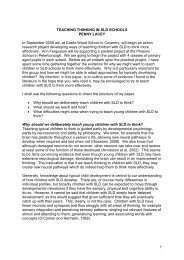
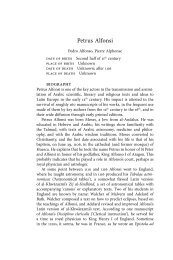
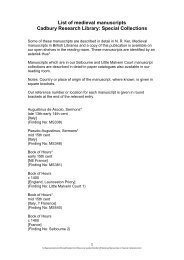
![Benyamin Asadipour-Farsani [EngD Conference abstract]](https://img.yumpu.com/51622940/1/184x260/benyamin-asadipour-farsani-engd-conference-abstract.jpg?quality=85)
